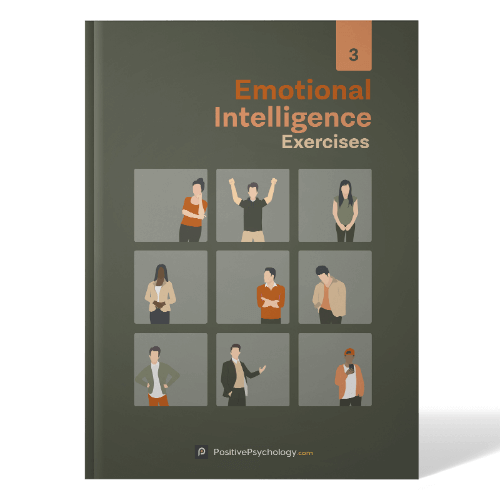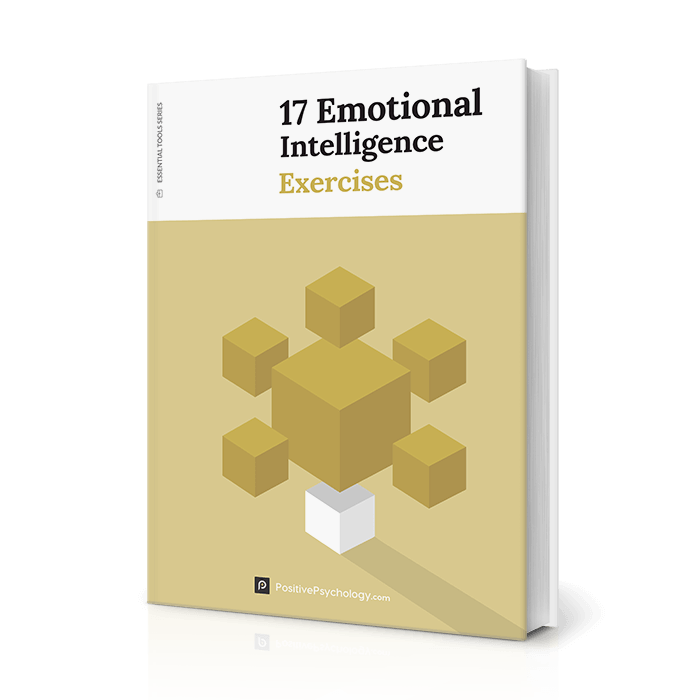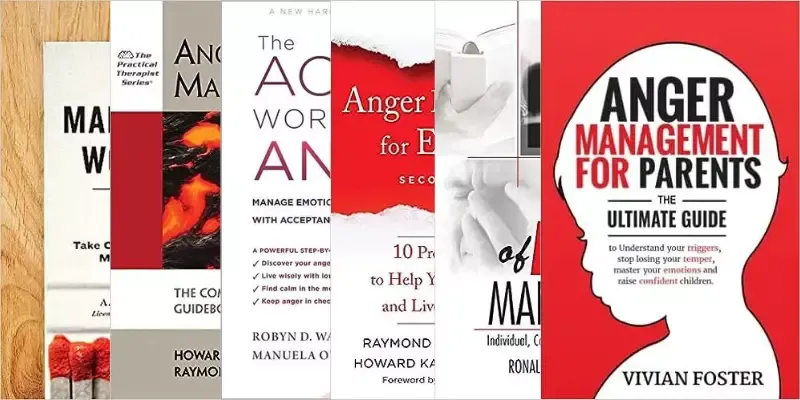Anger Management for Teens: Helpful Worksheets & Resources
 Anger is not all bad.
Anger is not all bad.
Used strategically, it can help us pursue our goals and, within limits, drive us to find a happier and healthier life in the long run (Young, 2013).
When misplaced or out of control, it can wreck relationships and even lives. In adolescents, severe angry behavior can lead to chronic mental and physical health conditions over time (Travis, 2012).
It is crucial that teenagers understand the links between how they think, feel, and act (Collins-Donnelly, 2012).
This article introduces some practical resources and worksheets to help teenagers recognize anger and manage emotions to avoid outbursts and destructive behavior.
Before you continue, we thought you might like to download our three Emotional Intelligence Exercises for free. These science-based exercises will enhance your ability to understand and work with your emotions and will also give you the tools to foster the emotional intelligence of your clients, students, or employees.
This Article Contains:
Anger Management for Teens Explained
Anger in children and teens is an upsetting emotion with the potential for long-term damage if left untreated. While crucial to spot early, parents may be unclear of the cause or triggering factors, and left frustrated regarding how best to help their child (Travis, 2012).
Failure to recognize, understand, and resolve this anger can lead to chronic mental health problems, including anxiety and depression (Travis, 2012).
Teenage anger
Anger is typically expressed differently depending on the age of the child. Adolescent teenagers show their anger in more grown-up ways, most likely using their developed language and motor skills.
The behavior can be extreme and potentially includes “engaging in acts of substance abuse, misconduct behavior, assault, verbal threats, and sexual behavior” (Travis, 2012, p. 3).
To help, the caregiver, parent, teacher, or therapist must understand what triggers the anger – whether normal or out of control – and how to teach coping mechanisms to avoid or calm an angry episode. The chemical composition of the teenage brain is in a constant state of change, with research suggesting angry behavior is associated with a lack of neurotransmitters (Travis, 2012).
As there are many potential triggers for teenagers, it is important to observe whether related behavior tends to occur at a particular time, such as:
- After school
- When hungry or tired
- Following changes to routines
- After viewing particular types of TV shows, movies, or online content
Anger-related behavior in teenagers
Adolescent teens are considerably more independent than younger children and express their anger similarly to adults. Behavior can be irritable, defiant, and high risk, involving various unhealthy or unhelpful acts, such as (Travis, 2012):
- Behaving rudely and disrespectfully to adults
- Getting into altercations and fights with other students
- Fits of rage, losing their temper, and becoming highly vindictive in what they say
- Behavior motivated by payback and revenge
- Engaging in substance abuse
- Declining academic standards; falling behind the mean for their age
Note that while frustrating for close family and friends, anger that is out of control rather than normal can indicate serious and deep emotional issues (Travis, 2012).
In her book Anger Management, Judy Dyer (2020) says that it is crucial to break the anger cycle.
Each angry response begins with a triggering event. It might be another person’s actions, an event, or even a memory (Dyer, 2020).
Then, several irrational thoughts start to form, followed by a series of negative emotions.
If nothing happens to break the process, physical symptoms kick in, such as shaking, sweating, or even feeling sick. Then, finally, potentially out of control, angry, aggressive, or destructive behaviors may begin (Dyer, 2020).
While it sounds like a complicated process with several stages, it can escalate from trigger to outburst surprisingly quickly in the young or someone with limited self-control.
Managing teenage anger
Thankfully, there are many ways that teenagers can learn to combat or reduce their degree of anger, including (modified from Travis, 2012; Buckley, 2020):
- Developing healthy and meaningful connections with a parent or guardian
- Forming well-developed social skills
- Having sufficient sleep is crucial at any age. Poor sleeping habits significantly affect our emotions, how we control them, and our overall mental wellbeing. Teenagers between 13 and 18 years old should get around 8.5 hours of sleep per night (Walker, 2018; Travis, 2012).
- Learning and adopting new skills in:
- Problem solving — Coming up with more than one solution to a problem.
- Anger management — Thinking before taking action and finding creative or physical outlets for anger.
- Self-reflection — Understanding and reframing situations to make a better assessment of events and the environment.
- Emotional awareness and regulation — Understanding the emotions that impact us and being capable of managing reactions to them.
- Assertiveness – Identifying when to concede ground and when to push for a desired outcome.
The worksheets and resources that follow help promote practical advice and develop better emotional management skills, language skills (becoming more able to talk about and explore feelings), and self-regulatory skills (improving control over emotions and anger).
6 Anger Management Worksheets for Teens

It can be beneficial to spend time together exploring the following indications that anger is becoming out of control (Travis, 2012):
- Getting angry at everything that causes stress
- Taking anger too far; for example, talking about seeking revenge or getting the person back for perceived wrongdoings
- Holding onto a grudge for too long or staying angry long after an event has passed
- Small events, such as someone being late, escalating and becoming a source of anger
Rather than covering for angry outbursts or giving in to demands, parents should recognize and understand that such behavior is neither normal nor acceptable (Buckley, 2020).
Instead, parents, teachers, and emotionally-focused therapists can “help the child reflect on their behavior and help provide guidance to coping with their anger” (Travis, 2012, p. 31).
In Starving the Anger Gremlin, Kate Collins-Donnelly (2012, p. 9) suggests a cognitive-behavioral therapy approach to managing anger in young people. She bases her guidance on “the premise that how we interpret experiences and situations has a profound effect on our behaviors and emotions.”
The following worksheets explore how to recognize anger, its triggers, and how to adopt healthier alternative coping styles and behavior (modified from Collins-Donnelly, 2012; Travis, 2012):
Understanding My Anger
Anger can appear unannounced, without warning. It can be helpful to recognize what it feels like early and the sort of behavior that can result (Collins-Donnelly, 2012).
Use the Understanding My Anger worksheet to help the teen identify how often they get angry, what it feels like, and the sort of behavior that arises.
Ask them:
- How often do you get angry?
- What does it feel like physically when you are angry?
- How do you react or behave when you feel angry?
- Can you think of three situations that typically make you angry where you could use more healthy behaviors?
Recognizing what it feels like to be angry and understanding that you have options regarding how you behave can be the first steps to gaining control over your anger.
What Makes Me Angry
We typically believe that other people or events make us angry, but it is our thoughts and beliefs that control our anger. We can, with practice, assume control over our feelings (Collins-Donnelly, 2012).
Use the What Makes Me Angry worksheet to encourage the teen to recognize that they have ultimate control over their anger.
Ask them to make a list of what makes them angry. Then consider each point in turn.
Help them understand that the decision to be angry is down to them. “It’s your thoughts and beliefs that make you angry” (Collins-Donnelly, 2012, p. 29).
Anger is about your reaction to the situation, not the situation itself.
Alternative Thoughts
Often, our thoughts about a situation or something that has happened are irrational and unrealistic. Such thinking can be unhelpful and make us emotional and even angry (Peters, 2018).
Use the Alternative Thoughts worksheet to help the teen recognize unrealistic thoughts and how they may blow the situation out of proportion. Then consider more rational, authentic thinking and how it could change the interpretation of the situation.
Ask them to think of three very specific situations that made them feel angry.
For each one, ask them to consider:
- How were you thinking about the situation when you became angry?
- What are the facts about the situation?
- Were your thoughts realistic and rational?
- What would more realistic and rational thoughts look like?
Reframing irrational thoughts can change the emotions and behaviors that arise.
Keep an anger diary
When there is no one around to talk to or ask for additional help, it can be valuable to capture thoughts and feelings, and self-reflect on angry episodes (Collins-Donnelly, 2012).
Use the Anger Diary worksheet to capture events or episodes that have led to feelings of anger.
The teenager reviews the diary once a week. They reflect on how they reacted to the situation and the consequences, and consider opportunities for using distraction techniques.
Impact of My Anger
Becoming angry can be upsetting for all involved. Often the angry person does not consider the impact they have on other people or the emotions they are left with.
Use the Impact of My Anger worksheet to capture examples of angry behavior and consider who has been impacted and how.
This exercise aims to help teenagers understand that the way we behave can upset others and impact how they feel.
Making Amends for My Angry Outburst
“More intimate relationships carry more emotion” (Peters, 2018, p. 104). When we say sorry to someone for our angry behavior, we send them the message that they and the relationship matter to us.
Teaching teenagers to apologize and offer something to make up for their wrongdoing is a valuable life lesson.
Using the Making Amends worksheet helps teenagers revisit what they have done, apologize for their behavior, and make things right.
Ask the teenager the following:
- What was the situation?
- Who did you upset?
- How were they upset? How would they feel?
- How and when could you apologize?
- How could you make amends?
Making amends can help you forgive yourself and move forward, learning from your mistakes.
Best Resources for Helping Youth
There are various resources available online that can inspire and educate young minds, help them manage their emotions, and offer essential parenting tips.
- Young Minds
This is a practical and helpful resource for teenagers who are keen to better understand the experience and emotions involved in anger. Additional links offer the interested reader additional guidance on depression and anxiety. - Anger Management for Teens
Written for teenagers, this uncomplicated site discusses how anger feels and offers guidance on how it can be managed. - Deal With Anger
This valuable guide for teenagers has practical tools to improve awareness and self-control. The five-step approach to managing anger is particularly beneficial. - Anger Overload in Children
This article offers parents, teachers, or guardians helpful guidance on diagnosing more severe anger issues and practical behavioral and cognitive techniques to assist teenagers in regaining control of their emotions. - Parenting Angry Teens
Try out the six tips for parenting angry teens and recognize that hostile teens are capable of becoming strong, healthy, independent adults.
4 Educational Videos for Youth and Students
Several valuable videos are available to help young people maintain or regain control of their emotions and find ways to avoid or reduce angry outbursts.
Try out some of the following with your teenagers:
How to Deal With Anger & Anger Management Tips
This engaging, fun, and insightful video put together with a video game backdrop explores the feelings of anger and the strategies that can help.
5 Keys to Controlling Anger
Anger management specialist Dr. Christian Conte offers helpful anger management tips.
Monitor and Manage Your Anger
Motivational philosopher and HuffPost Rise host Jay Shetty takes the viewer through how to spot, manage, and deal with anger.
Anger Is Your Ally
This excellent TED talk from Juna Mustad explores how to create a healthier relationship with anger through mindfulness techniques.
PositivePsychology.com’s Anger Management Tools
We have plenty of tools, worksheets, and activities to help anyone recognize angry feelings before they take control and better understand the anger triggers that cause an upset.
- Anger Exit and Re-entry
This worksheet helps clients recognize when best to disengage from conflict or difficult conversations, cool down, and re-engage later to facilitate greater insight and joint problem-solving. - Red Light: Anger!
While typically aimed at younger children, this worksheet invites clients to draw pictures of their anger at different intensities and identify early signs of anger using a stop sign analogy. - The EQ 5-Point Tool
This tool can help your clients learn to defuse conflict in an emotionally intelligent way using brief, respectful, and clear communication. - Spot-Check of Your Anger
This worksheet presents a series of questions to help clients mindfully focus on signals of rising anger and consider appropriate actions to take in response. - Recommended reading
This selection of anger management books includes various options and workbooks, just right for helping with teenager problems.
17 Emotional Intelligence Exercises
If you’re looking for more science-based ways to help others develop emotional intelligence, this collection contains 17 validated EI tools for practitioners. Use them to help others understand and use their emotions to their advantage.
A Take-Home Message
While anger in an appropriate situation can be beneficial, it must be to the “right degree, at the right time, and for the right purpose” (Young, 2013). Otherwise, misplaced or disproportionate anger can be damaging for the individual and those around (Travis, 2012).
At school, children may exhibit anger and adopt risky behavior, break the rules, skip classes, and engage in potentially harmful pranks. Typically, teens with anger issues have not learned appropriate coping mechanisms or been taught the skills needed to manage their anger (Travis, 2012).
Without clear guidelines in place or structures to control their anger, teenagers can have difficulty understanding the impact of their actions on others or themselves.
However, children and young adults can learn skills that help them avoid triggers that lead to angry behavior, assist in managing irate outbursts, and provide the means to restore calm (Collins-Donnelly, 2012).
Teenagers can develop the capacity to understand and cope with their anger-related issues and acquire anger management skills much better than younger children. As language skills develop, soon-to-be adults can be taught to better explain and reflect on their feelings and process their emotions (Collins-Donnelly, 2012).
Learning self-regulatory skills can help control angry impulses, “their retaliations, frustration level, and anger arousal state, and limit their emotional outbursts” (Travis, 2012, p. 394).
Try out some of the worksheets and resources in this article with the teenagers exhibiting anger issues. Crucially, they can help young adults recognize and voice their own emotions and develop the skills needed to manage rather than escalate feelings of anger.
We hope you enjoyed reading this article. Don’t forget to download our three Emotional Intelligence Exercises for free.
- Buckley, D. (2020, August 27). Strategies for teenagers’ anger management. BetterHelp. Retrieved June 15, 2021, from https://www.betterhelp.com/advice/anger/strategies-for-teenagers-anger-management/
- Collins-Donnelly, K. (2012). Starving the anger gremlin: A cognitive behavioural therapy workbook on anger management for young people. Jessica Kingsley.
- Dyer, J. (2020). Anger management: How to take control of your emotions and find joy in life. Pristine.
- Peters, S. (2018). The silent guides: Understanding and developing the mind throughout life. Lagom.
- Travis, R. L. (2012). Overcoming anger in teens and pre-teens: A parent’s guide. Author.
- Young, E. (2013, February 6). Do get mad: The upside of anger. New Scientist. Retrieved June 15, 2021, https://www.newscientist.com/article/mg21729032-700-do-get-mad-the-upside-of-anger/
- Walker, M. P. (2018). Why we sleep: The new science of sleep and dreams. Penguin Books.
Let us know your thoughts
Read other articles by their category
- Body & Brain (49)
- Coaching & Application (57)
- Compassion (26)
- Counseling (51)
- Emotional Intelligence (24)
- Gratitude (18)
- Grief & Bereavement (21)
- Happiness & SWB (40)
- Meaning & Values (26)
- Meditation (20)
- Mindfulness (45)
- Motivation & Goals (45)
- Optimism & Mindset (34)
- Positive CBT (28)
- Positive Communication (20)
- Positive Education (47)
- Positive Emotions (32)
- Positive Leadership (18)
- Positive Parenting (4)
- Positive Psychology (33)
- Positive Workplace (37)
- Productivity (16)
- Relationships (46)
- Resilience & Coping (36)
- Self Awareness (21)
- Self Esteem (37)
- Strengths & Virtues (31)
- Stress & Burnout Prevention (34)
- Theory & Books (46)
- Therapy Exercises (37)
- Types of Therapy (64)





What our readers think
I have understood now that having anger can be a good thing or a bad thing depending on how you use it. You can use it for protecting yourself or even someone else. But you can also abuse your ability of anger by bullying people, fighting for an unnecessary reason, or even just being a jerk. These are three favorite things to do when I get angry; number one is to take five or ten deep breaths, number two do about 10 or 20 push ups, number three scream or fight your pillow. All of these things will help let all of that anger, stress, and anxiety that has been building up inside of you. You can use these when you feel like you need to calm down and take a breather. Next time someone makes me mad or stressed I know what to do when that time comes, I can either take deep breaths, do push ups, or let it all out on my pillow when I get home. I have also learned how to not take things too seriously. If you take things too seriously no one is going to want to joke around with you because everytime they make a joke you get all in your feelings and start to get upset and angry at the person who made the joke. Also if people know that you can’t take a joke no one is gonna want to be your friend, because no one wants a friend that can make jokes but can’t take jokes, if you get mad that someone is joking with you and you get mad that is not fair to the person that wants to have fun, your not the only one who can make jokes and get away with it, other people want to have fun to, and that is why we all need to control our anger.
Is there a therapist in the Seattle who works with this issues with adoloscents?
Hi Suzanne,
Thank you for your question. As we are not based in the US, it is difficult for us to make recommendations for reliable therapists. I suggest you look for a therapist directory in your area and filter your search.
I hope this helps 🙂
Kind regards,
-Caroline | Community Manager